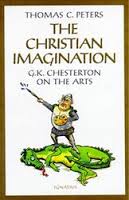The mind of G.K. Chesterton was a field of corn. Not only was he a prolific source of thoughts, each one a stalk of corn, but each one of them contained hundreds of kernels, each of them capable of multiplying as well. He didn’t just write a lot — he was fruitful.
He was at his most fruitful when he talked about the arts and imagination because that is where he was discussing the center of his power as a writer. And in this book, Thomas Peters brings together a delightful set of observations from Chesterton on the arts, and competently discusses them himself. If you love Chesterton, if you want to write with effect, if you are fond of inexplicable explanations, or all of the above and more, then this is a book you must have.
Gems from Chesterton on the imagination and its failures are found throughout the book. If you are involved in this arena at all, then this book is indispensable. It is probably indispensable regardless.
“Towers are not tall unless we look up at them; and giants are not giants unless they are larger than we. All this gigantesque imagination, which is, perhaps, the mightiest of the pleasures of man, is at bottom entirely humble” (p. 71).
“I am not depreciating telephones; I am complaining that they are not appreciated. I am not attacking inventions; I am attacking indifference to inventions . . . I am not objecting to the statement that the science of the modern world is wonderful; I am only objecting to the modern world because it does not wonder at it” (p. 57).
On critics, here is Peters summarizing Chesterton.
“Concerning the critics, G.K. had a great deal to say, but his observations can be divided into four general issues: their bias against morality in the arts, their unreflecting progressivism, their incessantly negative orientation, and their propensity to faddishness” (p. 71).
Boy, things sure have changed since Chesterton’s time!



This observation hearkens back to what the choicest quote in one of the choicest chapters (“Ship of Fools”) from P. J. O’Rourke :